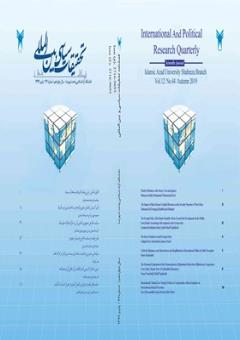Clarifying the relationship between cultural development and values (a case study of citizens living in Shiraz)
Subject Areas : Political Sciences- International Relationsbijan jani 1 * , Majid Reza Karimi 2 , کرامت اله راسخ 3
1 - islamic azad university of jahrom
2 - Humanities Department, Sociology Faculty, Islamic Azad University, Jahrom Branch
3 - دانشیار جامعه شناسی دانشگاه آزاد واحد جهرم
Keywords: cultural development, value, development, culture, fetalism, ethnocenterism.,
Abstract :
The inability of classical theories of development, such as "dependency theory" and "modernization theory", cultural development and its impact on development became of special importance. Cultural development faces obstacles. Determinism and ethnocentrism are among the major obstacles that stand against cultural development, the categories that are the subject of this research. Determinism and ethnocentrism were measured as independent variables and cultural development as a dependent variable. The purpose of investigating the effect of these obstacles on cultural development is to emphasize the change of the structure of values in the families of Shiraz city. This research was carried out using a survey method.The sample was 384 citizens living in Shiraz, whose number was calculated using Cochran's formula, and a questionnaire was distributed among the families of the statistical population from cluster sampling. The findings showed that the two variables of ethnocentrism and fatalism have a definite effect on the determination of social values, and there is a significant relationship at the level of 99% and above, and the hypotheses are confirmed. Also, the findings show that the tendency towards ethnocentrism and fatalism have an influence on democracy, globalization and scientism and are an obstacle in the way of cultural development.
1. آزاد ارمکی، تقی (1376)، بررسی نظریه نوسازی: مطالعه موردی دربارة تقدیرگرایی فرهنگی در ایران، نشریه فرهنگ، شماره 22 و 23: 208-191
2. احمد زاده کرمانی، روح الله (1390)، باز اندیشی در فرهنگ و رسانه، تهران، نشر چاپا
3. پهلوان، چنگیز (1378)، فرهنگ شناسی،گفتارهایی در زمینه فرهنگ و تمدن، تهران، انتشارات پیام امروز.
4. جلایی پور، حمیدرضا، (1392)، نظریه پردازان متأخر جامعهشناسی، انتشارات دانشگاه تهران.
5. ریویر، کلود، (1386)، درآمدی بر انسان شناسی، ترجمه ناصر فکوهی، چاپ هفتم، تهران، نشر
6. لهسایی زاده، عبدالعلی (1381)، جامعه شناسی توسعه، تهران، انتشارات دانشگاه پیام نور
7. هیوود، اندرو، (1389)، سیاست، ترجمه عبدالرحمن عالم، تهران، نشرنی.
8. یوسفی، علی، احمد رضا اصغرپور ماسوله، (1388)، «قوم مداری و اثر آن بر روابط بین قومی در ایران»، دانشنامه علوم اجتماعی، دوره 1، شماره 1.
9. عبدالهی، محمد ،(1380)، «تنوع قومی درایران، چالش ها و فرصت ها، بخش دوم»، فصلنامه مطالعات ملی، سال سوم، شماره9.
10. گیدنز، آنتونی، (1385)، جامعه شناسی، ترجمه منوچهر صبوری، نشرنی، تهران.
11. ساروخانی، باقر.(1380). مقدمه ایی بر دایرة المعارف علوم اجتماعی. تهران: انتشارات کیهان. چاپ سوم.
12. شجاعی، جواد. (1384). عوامل روانی- اجتماعی بر تقدیرگرایی. پایان نامه کارشناسی ارشد. دانشگاه اصفهان.
13. راستی، هادی، اسماعیل رحمانی، (1395)، «بررسی عوامل موثر بر میزان تقدیر گرایی در نواحی روستایی»، فصلنامه راهبردی اجتماعی فرهنگی، سال پنجم، شماره نوزدهم.
14. عرفان منش، ایمان، (1400)، «تناظر اصل قوم مداری روش شناختی ماکس وبر با جامعه شناسی بومی-تمدنی: پردازش مفهومی برای «تمدن-جامعه شناسی»، نشریه: نظریه های اجتماعی متفکران مسلمان.
15. یوسفی، علی، احمد رضا اصغرپور ماسوله، (1388)، «قوم مداری و اثر آن بر روابط بین قومی در ایران»، دانشنامه علوم اجتماعی، دوره 1، شماره 1.
1. Deaux, Kay, (2001), "Social Identity", City University of New York, Academic Press
2. Webester,A ,(1991), Introduction to the Sociology of Development, London, Macmilan.
3. Magdaienda Paskowska-Schnass and Agnieszka Widuto, (2022),EPRS/European Pariamentary Research Service.
4.Armbrecht,J and Andersson T.D.(2013), Culture and Value Creation. A Scandinavian Perspective , Routledge.

